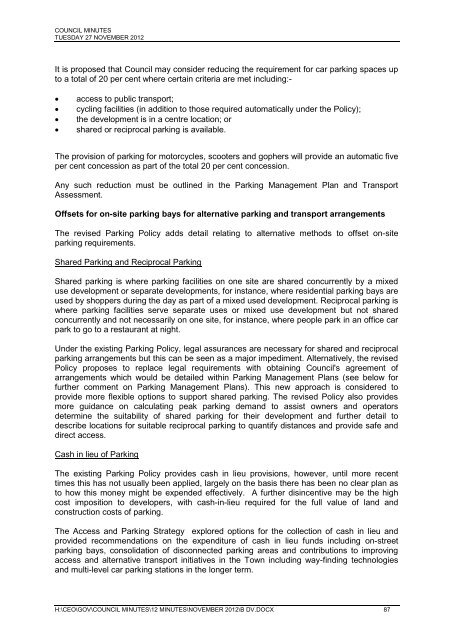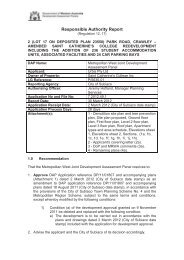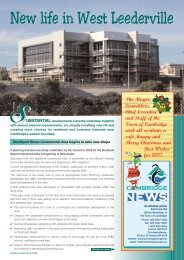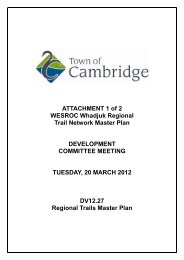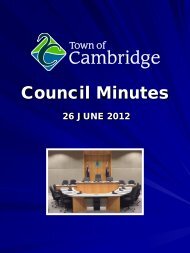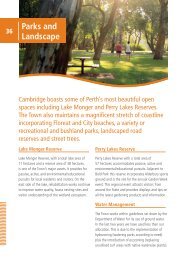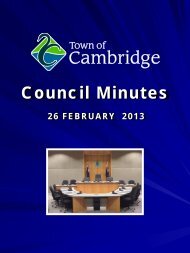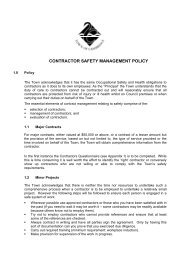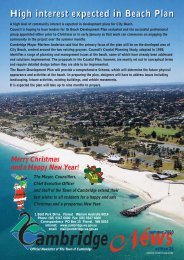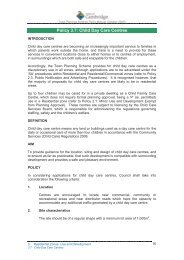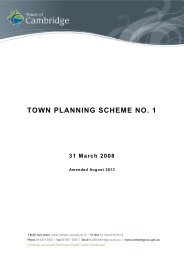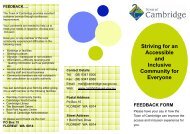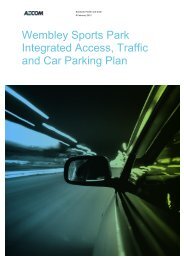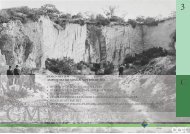MEETING OF COUNCIL - Town of Cambridge
MEETING OF COUNCIL - Town of Cambridge
MEETING OF COUNCIL - Town of Cambridge
Create successful ePaper yourself
Turn your PDF publications into a flip-book with our unique Google optimized e-Paper software.
<strong>COUNCIL</strong> MINUTES<br />
TUESDAY 27 NOVEMBER 2012<br />
It is proposed that Council may consider reducing the requirement for car parking spaces up<br />
to a total <strong>of</strong> 20 per cent where certain criteria are met including:-<br />
• access to public transport;<br />
• cycling facilities (in addition to those required automatically under the Policy);<br />
• the development is in a centre location; or<br />
• shared or reciprocal parking is available.<br />
The provision <strong>of</strong> parking for motorcycles, scooters and gophers will provide an automatic five<br />
per cent concession as part <strong>of</strong> the total 20 per cent concession.<br />
Any such reduction must be outlined in the Parking Management Plan and Transport<br />
Assessment.<br />
Offsets for on-site parking bays for alternative parking and transport arrangements<br />
The revised Parking Policy adds detail relating to alternative methods to <strong>of</strong>fset on-site<br />
parking requirements.<br />
Shared Parking and Reciprocal Parking<br />
Shared parking is where parking facilities on one site are shared concurrently by a mixed<br />
use development or separate developments, for instance, where residential parking bays are<br />
used by shoppers during the day as part <strong>of</strong> a mixed used development. Reciprocal parking is<br />
where parking facilities serve separate uses or mixed use development but not shared<br />
concurrently and not necessarily on one site, for instance, where people park in an <strong>of</strong>fice car<br />
park to go to a restaurant at night.<br />
Under the existing Parking Policy, legal assurances are necessary for shared and reciprocal<br />
parking arrangements but this can be seen as a major impediment. Alternatively, the revised<br />
Policy proposes to replace legal requirements with obtaining Council's agreement <strong>of</strong><br />
arrangements which would be detailed within Parking Management Plans (see below for<br />
further comment on Parking Management Plans). This new approach is considered to<br />
provide more flexible options to support shared parking. The revised Policy also provides<br />
more guidance on calculating peak parking demand to assist owners and operators<br />
determine the suitability <strong>of</strong> shared parking for their development and further detail to<br />
describe locations for suitable reciprocal parking to quantify distances and provide safe and<br />
direct access.<br />
Cash in lieu <strong>of</strong> Parking<br />
The existing Parking Policy provides cash in lieu provisions, however, until more recent<br />
times this has not usually been applied, largely on the basis there has been no clear plan as<br />
to how this money might be expended effectively. A further disincentive may be the high<br />
cost imposition to developers, with cash-in-lieu required for the full value <strong>of</strong> land and<br />
construction costs <strong>of</strong> parking.<br />
The Access and Parking Strategy explored options for the collection <strong>of</strong> cash in lieu and<br />
provided recommendations on the expenditure <strong>of</strong> cash in lieu funds including on-street<br />
parking bays, consolidation <strong>of</strong> disconnected parking areas and contributions to improving<br />
access and alternative transport initiatives in the <strong>Town</strong> including way-finding technologies<br />
and multi-level car parking stations in the longer term.<br />
H:\CEO\GOV\<strong>COUNCIL</strong> MINUTES\12 MINUTES\NOVEMBER 2012\B DV.DOCX 87


